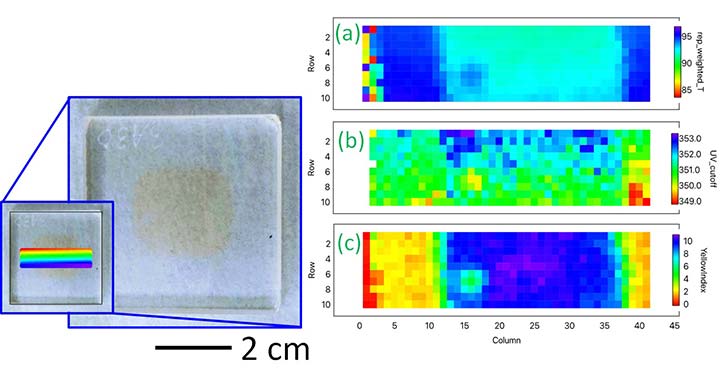High-Throughput Optical Mapping for Accelerated Stress Testing of Photovoltaic Module Materials
DuraMAT will develop a spectroscopy capability that will enable automated measurements of photovoltaic (PV) arrays of coupons as well as spatial mapping within a coupon.
In addition, the switch from a scanning spectrophotometer with a point detector (which measures one wavelength at a time) to CCD array-based spectrometers (which measure the full spectrum simultaneously) will reduce the measurement time from the present rate of 6 minutes per specimen. All the measured spectra will also be automatically analyzed and made available via the DuraMAT DataHub.
Testing of coupon specimens (e.g., sheet material, laminated glass/polymer/glass, etc.) is an established method to evaluate a wide variety of PV packaging materials for purposes including screening and degradation rate modeling. In practice, many coupons can be simultaneously aged in outdoor or accelerated testing. However, for optical performance characterization (hemispherical transmittance or reflectance), the coupons are presently measured one at a time using a commercial spectrophotometer. This slow and labor-intensive measurement process limits the scope and size of coupon studies and further, usually only the center of the coupon is measured. However, prior studies show that degradation and consequent material damage are often spatially distributed as a function of water- and oxygen-ingress with the size of the affected region being material (formulation) dependent.
Core Objective
Disruptive Acceleration Science
Location
National Renewable Energy Laboratory
Applications
This novel instrument enables rapid optical characterization of material, coupon, or mini-module specimens:
- Characterize samples before and after aging
- Optical mapping within specimens.
Availability
Available to collaborators at national labs and industry.
References
David C. Miller, Jayesh G. Bokria, David M. Burns, Sean Fowler, Xiaohong Gu, Peter L. Hacke, Christian C. Honeker, Michael D. Kempe, Michael Köhl, Nancy H. Phillips, Kurt P. Scott, Ashish Singh, Shigeo Suga, Shin Watanabe, Allen F. Zielnik, “Degradation in Photovoltaic Encapsulant Transmittance: Results of the First PVQAT TG5 Study”, Progress in Photovoltaics: Research and Applications, 27 (5) 2019, 391-409. https://doi.org/10.1002/pip.3103
David C. Miller, Asher Einhorn, Clare L. Lanaghan, Jimmy Newkirk, Bobby To, Helio R. Moutinho, Paul F. Ndione, Jim J. John, Lin J. Simpson, Chaiwat Engtrakul, “The Abrasion of Photovoltaic Glass: A Comparison of the Effects of Natural and Artificial Aging”, IEEE Journal of Photovoltaics, 10 (1), 2020, 173-180
David C. Miller, Hussameldin I. Khonkar, Rebeca Herrero, Ignacio Antón, David K. Johnson, Thorsten Hornung, Tobias Schmid- Schirling, Todd B. Vinzant, Bobby To, Gabriel Sala, and Sarah R. Kurtz, “An End of Service Life Assessment of PMMA Lenses from Veteran Concentrator Photovoltaic Systems”, SOLMAT, 167, 2017, 7-21.
Jimmy M. Newkirk, Illya Nayshevsky, Archana Sinha, Adam Law, QianFeng Xu, Bobby To, Paul F. Ndione, Laura T. Schelhas, John M. Walls, Alan M. Lyons, David C. Miller, “Artificial linear brush abrasion of coatings for photovoltaic module first-surfaces”, Solar Energy Materials and Solar Cells, Proc. International Soiling Workshop, 2019. https://pvqataskforceqarating.pbworks.com/w/file/136901268/4-6%20Miller%20IEC_62788-7-3.pdf
Contact
To learn more about this project, contact David Miller.
Optical mapping of a glass/EVA/glass coupon after xenon weathering. The instrument capability allows for spatial quantification of the: (a) optical transmittance [PV device representative, solar weighted]; (b) UV cut-off wavelength; and (c) yellowness index (discoloration).

Optical mapping of a glass/EVA/glass coupon after xenon weathering. The instrument capability allows for spatial quantification of the: (a) optical transmittance [PV device representative, solar weighted]; (b) UV cut-off wavelength; and (c) yellowness index (discoloration).